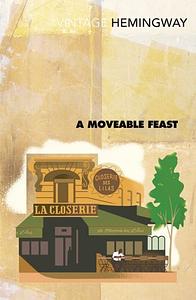Take a photo of a barcode or cover
Hemingway's memoir of his early Paris years. I found it enjoyable, but not captivating. But it's a good read for aspiring writers. The numerous alternative drafts included at the end make it clear how devoted he was to the craft, and how time-consuming it is to write well.
It's been a while since I've read any Hemingway, but I've always loved his clean prose. Here we get a more intimate portrait of him as a writer, a husband, and a father, and the prose is messier--he died before he finished writing it. I was surprised by the vulnerability that seems to suffuse this account of his time in Paris. Perhaps that reveals more about me as a reader than Hemingway as a writer. At any rate, it is well worth reading, if for no other reason than to daydream about going to Paris and writing in cafes.
Me gustan los libros de chismes y este es un libro de chismes. Hemingway relata trocitos de su vida en París, cuando era joven y estaba casado con la primera de sus mujeres, cuando aún no publicaba su primera novela y "eran pobres, muy pobres", pero felices.
Algunos capítulos tienen mejor ritmo que otros, pero de todas maneras es interesante encontrar menciones a personajes famosos de la literatura de la época. En cualquier sinopsis del libro los mencionan, así que no cuenta como spoiler: Gertrude Stein, Ezra Pound, los Fitzgerald... en situaciones cotidianas. A veces incómodas, a veces tiernas, a veces raras. Soy fan del cotilleo que narra.
Me gusta mucho cuando platica sobre el ciclismo y el asunto de los bigotes de los camareros. Y "la plática" última con Fitzgerald. Bueno, todo Fitzgerald lo cuenta como algo sumamente idiota, me reí en esos capítulos.
No conozco París, así que por ese lado no entendí mucho, pero supongo que si ubicas las calles y los caminos como él los va contando, te da la nostalgia.
El final es súper, súper bonito y triste. Los últimos párrafos, no el último capítulo (el último capítulo es un poquitín pesado). Pero awwww. El final.
Me gusta más "Diario de un genio", de Dalí (de este estilo), pero como este es cortito y agradable, lo recomiendo también.
Algunos capítulos tienen mejor ritmo que otros, pero de todas maneras es interesante encontrar menciones a personajes famosos de la literatura de la época. En cualquier sinopsis del libro los mencionan, así que no cuenta como spoiler: Gertrude Stein, Ezra Pound, los Fitzgerald... en situaciones cotidianas. A veces incómodas, a veces tiernas, a veces raras. Soy fan del cotilleo que narra.
Me gusta mucho cuando platica sobre el ciclismo y el asunto de los bigotes de los camareros. Y "la plática" última con Fitzgerald. Bueno, todo Fitzgerald lo cuenta como algo sumamente idiota, me reí en esos capítulos.
No conozco París, así que por ese lado no entendí mucho, pero supongo que si ubicas las calles y los caminos como él los va contando, te da la nostalgia.
El final es súper, súper bonito y triste. Los últimos párrafos, no el último capítulo (el último capítulo es un poquitín pesado). Pero awwww. El final.
Me gusta más "Diario de un genio", de Dalí (de este estilo), pero como este es cortito y agradable, lo recomiendo también.
After a decade of this sitting on my shelf, I finally read it while listening to the audiobook since I don’t speak French. I enjoyed about half of the stories. I did like reading Hemingway in college and listening to everyone argue about his writing style.
This is the 2009 reprint of the 1964 version I read and wrote about in the 1990s: the additions add much to the sketches reflecting parts of Hemingway's life in Paris in the 1920. He is more sympathetic, somehow, as is his portrait of Fitzgerald. But the best parts of this memoir are the descriptions of the streets, cafes, and food in Paris. His style works best when describing things and emotions and observed conversations, or even conversations between himself and those he dislikes or admires--it fails, to me, when he is attempting intimate dialogue. This reading, more than any other, makes me want to read the biography of Hadley (and no, not The Paris Wife, which was just silly). Paris: I'm ready to visit the streets and café Hemingway meticulously notes in this memoir! (And it looks like Hemingway's favorite café, Le Closerie des Lilas, exists, in full touristy splendor, though I'm surprised it is in the 6th arr. rather than the 5th: http://www.closeriedeslilas.fr/)
dark
emotional
reflective
medium-paced
So so beautiful. Hemingways style of writing in this novel is so human, it made me miss Paris so much, but not for the noted parts, but the little mundane things that he managed to express on a page. Wonderful read
This recollection takes you through literary Paris, peopled with some of the greatest authors and poets of the 20th century: Fitzgerald, Pound, Stein, James Joyce and, of course, Hemingway.(I'm sure I missed a few). The book is an insider's view of the lives of these writers and their sometimes the lives of their loved ones. The writers life is hard now, and it was difficult then too, but you get the meaning of sacrifice from his tales.
If you enjoy Hemingway's style, the use of many "and" and long sentences along with visceral descriptions of people and places, you'll love this book.
If you enjoy Hemingway's style, the use of many "and" and long sentences along with visceral descriptions of people and places, you'll love this book.
This book was maybe the biggest waste of my time, ever. Not only was the writing incredibly poor (I felt as if it had been written by a 10 year old), the moments written about were not compelling in the slightest. I think I learned more about F. Scott Fitzgerald at the end than I did about anything related to Hemingway throughout the whole book.
I hadn't read Hemingway since high school and didn't really care for him then. After reading "The Paris Wife" though I decided to read his side of the story. This is the first book by him that I have liked. Maybe I will give him another try.






